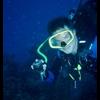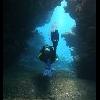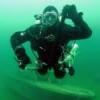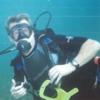
Always Check Your Air
#1

Posted 19 March 2005 - 07:19 PM
This was our third tank dive. Four of us dove the Chuyo Maru wreck, about 95â down. I was about 10â above and 10â from Keith (Divemaster) he was showing Ania a leaf fish. I felt a tugging and pulling; turning around to see what was going on, Tim was in my face on my octopus. As I have the hose tucked into my BC, I immediately pulled it out made sure he was OK descended to Keith. And he was given Keithâs Octopus and we resumed our dive.
Upon getting back on the boat Tim said something to the effect âIâm a bloody professional how stupid of me to let this happenâ. He said I gave him a new Birthday! Tim owns two very well known diving resorts in the Philippine Sea area. He is a Master Divemaster.
What happened is he thought his tank was changed outâ¦â¦it was not! AND HE DID NOT CHECK HIS AIR! Last year I was diving with probably the best-known diving operation in Kona. I changed out my tank after the first dive, checked the air had 3100 psi and turned off the tank. Then to the back of the boat for lunch. Second dive, about 40â down check my airâ¦..0. Get the divemasters attention, he checks to make sure my air is fully on, it was. So he starts to swim back to the mooring line. I grabbed him and did the same thing as Tim. What happened was one of the deck hands changed my tank to an empty tank (By accident) while I was having lunch.
This can happen to anyone!
ALWAYS CHECK YOUR AIR BEFORE YOU JUMP IN THAT POOL!!!!
#2

Posted 20 March 2005 - 08:20 PM
Yes, always check your air, but also tell the crew to keep their hands off your gear.
DSSW,
WWW
#3

Posted 20 March 2005 - 09:41 PM
....... it's never happened to me before or since.......I guess it's true, what doesn't kill ya makes ya stronger!
.....I'm now pretty religious about confirming my air status......and I mount my tank high enough to reach the valve as well...........live and learn.
Karl
#4

Posted 21 March 2005 - 05:34 AM
DSSW,
WWW
#5

Posted 21 March 2005 - 12:45 PM
Mine is not as dramatic. We where doing our second shore dive at Moneterey. I had changed out my tank and the pressure was good. I laid my gear down and had for some unknown reason decided to turn off my air. We geared up and headed out to the dive site. As we entered the water we inflated our BC's and kicked to where we were going to decend. I took a breath before the decent and did not have any air. I had forgotten to turn my air back on
Scott
:lam:
- Albert Einstein
"Do, or do not. There is no 'try'."
- Yoda ('The Empire Strikes Back')
"And the trees are all kept equal by hatch, axe, and saw"
- Rush (The Trees)
#6

Posted 22 March 2005 - 08:52 AM
Good posts... When I was actively teaching, I took liberty to teach something we always teach in tech/cave... being able to reach and turn on/off your air under water. Yes, tanks should be mounted so they are reachable. Be familiar with the valves on your tank set up. If you get the other half of a "doubles" valve, it could face the opposite way. This is unlikely to happen with a "commercial recreational diving operation", but I have learned to never say never. Teaching students to turn on/off their own valves in a relaxed situation makes it second nature when an emergency arises. With recreational gear, I can easily remove my tank/harness from my body, make adjustments as needed, and put it back on, while maintaining neutral buoyancy. My point is that recreational dive training has removed so much of the "so called stress inducing training" that divers haven't developed much of a solution thinking process for such situations. We want diving to be fun... but it is a good idea to spend some time thinking about the things you can do for yourself in an emergency. Sometimes, the air is on a quarter turn, which is not enough to provide air at depth, but it will register a full tank at the surface when not much air is required for a breath. This is why it is so important to turn the valve ALL THE WAY ON for the dive. THis way, it is either ON or OFF... but not partially on. You will likely notice if the air is all the way OFF when you get ready to enter the water... if you are sure to take a few deep breaths before jumping in. Watching your SPG while doing this will usually show you if your valve is barely turned on (fluctuating needle) or off (needle retreats towards zero and stays there)......I'm now pretty religious about confirming my air status......and I mount my tank high enough to reach the valve as well...........live and learn.
Karl
Stay safe! Check early, check often!
ITB...
Actually, the WORST day of diving is better than the BEST day at work...
and... my life is not measured by the number of breaths I take, but by the number of breaths I take UNDER WATER
"I see you are no stranger to pain." -- "I was married... TWICE!!!" HOT SHOTS, PART DEUX
#7

Posted 22 March 2005 - 10:26 AM
One nice thing about double tanks... the valves are far more easy to reach than a standard recreational rig. Right now my flexibility is such that I can reach them in a recreational reg in a pinch, but it isn't comfortable. A free flow may necessitate this happening in spite of all the precautions, though. (Happens in cold water)
#8

Posted 22 March 2005 - 02:38 PM
Good points. Another thing to keep in mind, is that when your reg starts free flowing (massively) as when it hits the water surface diaphram first... if the water isn't too cold you can usually stop it best by either holding your other hand in front of the mouthpiece hole... close enough to build back pressure into the mouthpiece and offset the imbalance of pressure that started the freeflow to begin with. I usually stick my thumb right into the hole itself and that will stop that type of free flow, unless it is in cold water. When in cold water, especially when the reg is then held up out of the water, the fast flowing air will "freeze" the moisture in the 2nd and cause it to stick open. Sometimes this can be corrected by simply doing the above procedure IN the water which may "warm" things up a bit. If not, you may have to shut the valve off to allow the time for the 2nd to warm sufficiently to unstick the "valve" in the second stage. This type of freeflow happens usually at the surface when the second stage is dropped into the water diaphram side down, or when removing the reg from your mouth (diaphram down position) under water and not turning the mouth piece to face down (to "balance the pressure"). When you are performing a safety drill (cave diving S-drill and your buddy starts your regulator freeflowing, you don't want him/her screwing around with slow procedures like turning valves off or adjusting spring tensions when a simple procedure with your thumb or butt of your hand will stop the problem. If you are diving shallow, you may not mind losing a hundred psi or so, but if you are deep or cave diving, you want to conserve every trickle of gas you can. I know this tip helped one of my former cave diving buddies... (and myself, as he was wasting MY gas).the valves are far more easy to reach than a standard recreational rig. Right now my flexibility is such that I can reach them in a recreational reg in a pinch, but it isn't comfortable. A free flow may necessitate this happening in spite of all the precautions, though. (Happens in cold water)
I hope this information benefits someone...
ITB
Actually, the WORST day of diving is better than the BEST day at work...
and... my life is not measured by the number of breaths I take, but by the number of breaths I take UNDER WATER
"I see you are no stranger to pain." -- "I was married... TWICE!!!" HOT SHOTS, PART DEUX
#9

Posted 22 March 2005 - 06:09 PM
On one of the deep Scapa dives I hadn't attached my drysuit feed to my suit properly. Just the two of us diving down to about 45 metres, visibility less than 3 metres, buddy leading, and at 10 metres my hose popped off and went clear over the back of my gear. There was a honking current so I didn't dare let go of the shotline, so I had no option but to continue to the bottom behind my buddy and then ask him to find my hose for me. Anyone who's ever experienced suit squeeze will know what I was going through.
#10

Posted 22 March 2005 - 06:22 PM
But all this discussion about Drysuits....... I have done only one dive trip in the last 5 years that the water was cooler than 78 degrees and that was in the Galapagos. I'm still get chilled thinking ABOUT IT! :dltears:
#11

Posted 22 March 2005 - 07:57 PM
I don't like my gear being changed out by anyone but that would make me even more apt to check the air. There's only one boat i dive on that offers this asThis was our third tank dive. Four of us dove the Chuyo Maru wreck, about 95â down. I was about 10â above and 10â from Keith (Divemaster) he was showing Ania a leaf fish. I felt a
a service but i've noticed most divers tell the ambitious mate not to bother.
I've let him do it to mine but end up double checking everything anyway,
straps, reg snug, air on...etc. Everyone has their own sense of pre-dive priorities
but i've always tended to lean VERY heavily toward that air supply ! I always
check my air after I'm buckled up that way any switch to an empty tank would be revealed !
Kevin
#12

Posted 22 March 2005 - 11:48 PM
I hope this information benefits someone...

ITB
Thanks. Believe me every piece of good safety information benefits us. I can certainly say so for myself!!!
I feel a bit paranoid breathing both my octo and reg before each dive but I would rather be paranoid and alive.......
#13

Posted 23 March 2005 - 07:43 AM
#14

Posted 23 March 2005 - 12:13 PM
I just don't feel as confident when checking someone else's work as I do checking my own. One advantage to diving nitrox is that I checked and signed for the tanks before the boat left. So MY tanks for the day stay in my custody and it is more difficult to grab an empty instead of a full tank. Even so, a pressure check with the valve wide open tells the story
#15

Posted 23 March 2005 - 12:47 PM
Good words to LIVE by!!!I feel a bit paranoid breathing both my octo and reg before each dive but I would rather be paranoid and alive.......
O.A.N.... I find my regulator and equipment maintenance requirements increase in frequency when I let other people change my gear out, so I try to do it myself. Even though I prefer to do this all myself, unless I stand there by my gear with my "z-knife" in my teeth
Very good posts and observations...
ITB
Actually, the WORST day of diving is better than the BEST day at work...
and... my life is not measured by the number of breaths I take, but by the number of breaths I take UNDER WATER
"I see you are no stranger to pain." -- "I was married... TWICE!!!" HOT SHOTS, PART DEUX
1 user(s) are reading this topic
0 members, 1 guests, 0 anonymous users



















